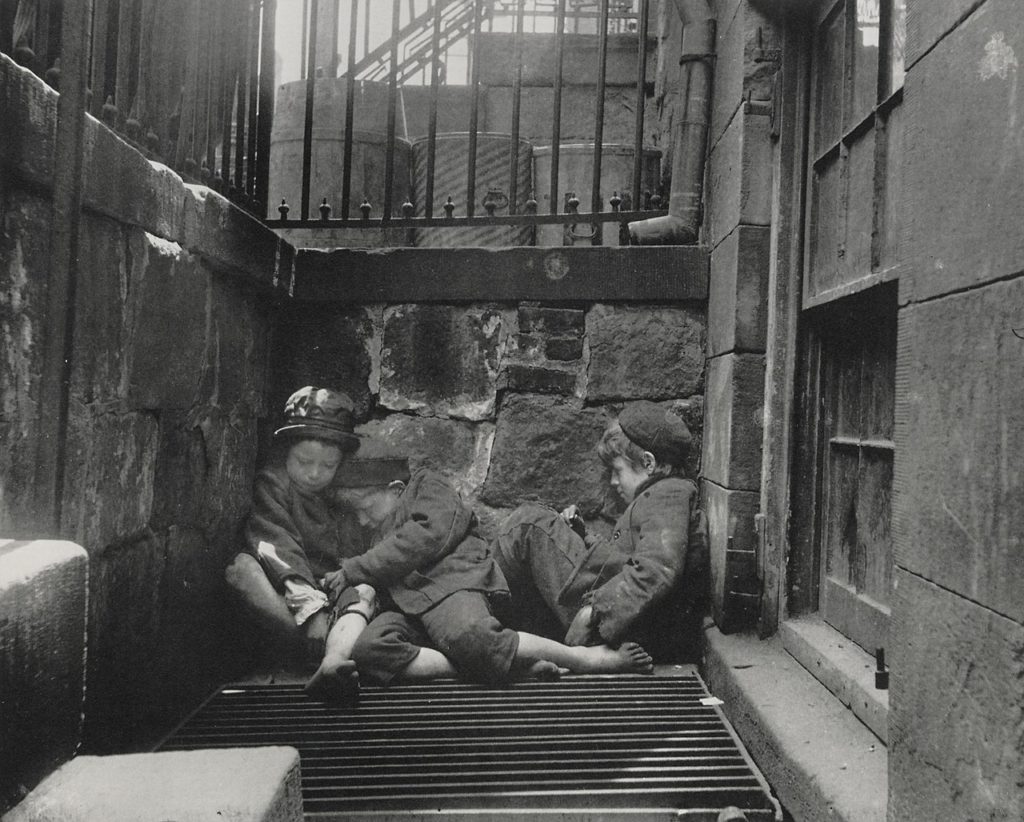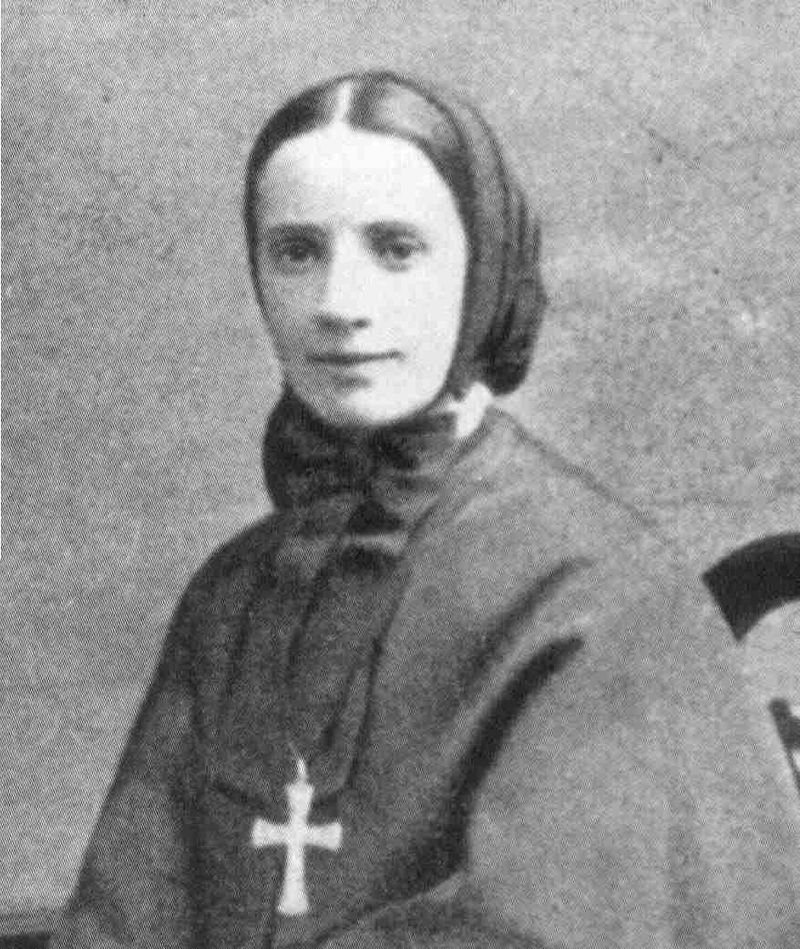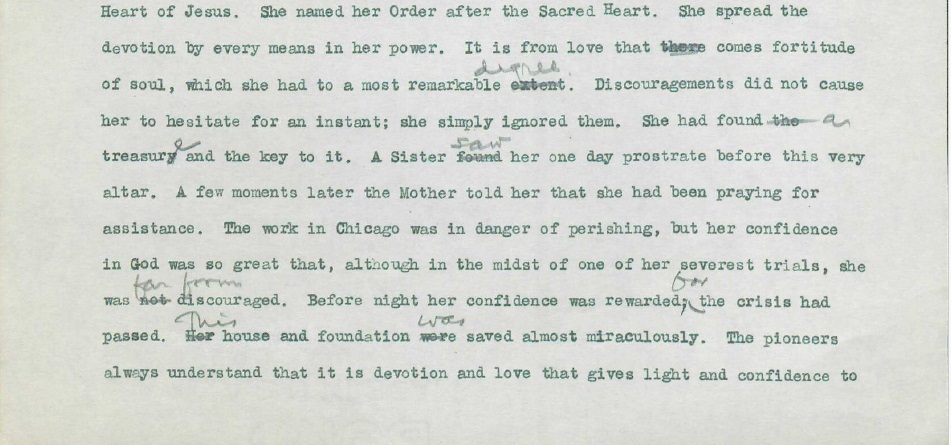In an era when women couldn’t vote, pursue professional careers, attend universities or hold public office, St. Frances Xavier Cabrini, driven by her faith, defied all odds to serve the most vulnerable and least among us at a turning point in American history. She became the first American saint by founding a movement of mercy that grew out of the country’s immigrant slums.
The foundress of the Missionary Servants of the Sacred Heart of Jesus died in Chicago on December 22, 1917. Five days later, Catholic Extension Society’s founder, Father Francis Clement Kelley, hailed Mother Cabrini as a “pioneer” in a sermon at a requiem Mass for the future saint.
As the movie “Cabrini” about the saint’s extraordinary life is set to be released on International Women’s Day, March 8, Catholic Extension Society is reaching into this “primary” source of history to share new insights about this woman of valor and determination.

Kelley’s sermon reveals that the passage of time was not needed to fully appreciate Mother Cabrini’s groundbreaking work. Here are some of the key takeaways.
His impassioned sermon—documented below with his notes—reveals several key insights regarding her personality, work and faith:
St. Frances Xavier Cabrini was recognized as a saint at the time of her death
Father Kelley named Mother Cabrini among the ranks of the apostles and most famed missionary saints who went out into the world to spread Christ’s message.
When she arrived in New York City in 1889, she found thousands of immigrants living in squalor without access to education or healthcare. Orphans had nowhere to go except the street.

Mother Cabrini, a foreigner herself, set to work establishing schools, orphanages and hospitals to care for and uplift these communities—fighting doubters and politicians all the way.
In her efforts to serve the suffering families living in America’s slums, he said, she illuminated God’s love and mercy:
“When Christ sent his apostles and their successors into the world to ‘preach the Gospel to every creature,’ He gave them a commission that was to last until the end of time, a commission demanding untiring labor on their part, and on the part of their successors, until the whole world should have heard its message. Christ willed that the light should shine amongst all peoples, so in every age new fields and new opportunities constantly open, and will open up to the end. For each of these new fields and opportunities there must be a pioneer. The history of the Church is full of them and their achievements. Such names as those of Benedict, Dominic, Augustine, Ignatius, Alphonsus, Philip Neri, Clare and Teresa, head the list – founders of great religious orders. Each had to climb a mountain and light on its summit a beacon to illumine the surrounding plains. Like her predecessors among the founders of religious orders, Mother Frances Xavier Cabrini was a pioneer, already canonized in the hearts of her spiritual daughters.”
He went on to describe Mother Cabrini’s immense efforts and tireless spirit—stating that just because her story was, at the time, “modern,” it was no less impressive than those of the most famous missionaries from centuries past.

Mother Cabrini was a “modern” pioneer and hero of her time
Father Kelly described Mother Cabrini as a pioneer. His admiration for her remarkable achievements was evident in his description of her as a woman with “zeal”—the most important quality for a modern-day missionary:
Zeal is the outstanding missionary virtue, the virtue that insures the triumph of faith, the virtue most pronounced in all the Christian pioneers. Every one of them burned with a zeal that made them invincible.”
He continued,
“Read attentively the history of the founders of religious orders, and note the sacrifices and sufferings each had to undergo in attaining the summit. The story of Mother Cabrini repeats the story of all the others, differing only in the fact that it was more modern. It is such a story of trials and sufferings, setback and misunderstandings, as to make us wonder at the possibilities for constancy in human nature. Even in success must the pioneer bear the cross. Like the other champions of the Faith, Mother Cabrini scaled the heights, climbed the steeps, swung across the dangerous chasms, forded the rushing streams, blazed a trail on the tall trees, and left marks of bleeding hands and wounded feet on rocks and bracken.”
She relied on God to overcome obstacles
Father Kelley recalled that Mother Cabrini faced obstacles from the very inception of her ministry. However, her trust in God carried her over every hurdle.
The limitations placed on what a woman could do in the world at the time was a challenge that began from her first dreams to become a missionary and lasted throughout her life. She fought a constant battle.
He said,
When Mother Cabrini told her confessor of her desire to be a missionary, he pointed out the first and greatest obstacle: there were no women missionaries. She hesitated not an instant but resolved to establish an order herself.”
In a few short years, her work attracted the attention of Rome, and she received an audience with Pope Leo XIII. Her heart was set on serving in China.
When the pope told her to go to America instead, she did not hesitate. She “turned her back on the East and looked to the West.”
Additionally, Father Kelley shared a personal story that took place in the very chapel in which he spoke.
Some years before, she laid herself before the altar and turned to God for help in a dire hour:
“A Sister saw her one day prostrate before this very altar. A few moments later the Mother told her that she had been praying for assistance. The work in Chicago was in danger of perishing, but her confidence in God was so great that, although in the midst of one of her severest trials, she was far from discouraged. Before night her confidence was rewarded; for the crisis had passed. This house and foundation was saved almost miraculously. The pioneers always understand that it is devotion and love that gives light and confidence to their footsteps.”

She established an unprecedented number of institutions for the poor
The most common statistic tied to Mother Cabrini is that she founded 67 institutions, including schools, orphanages and hospitals.
Father Kelley acknowledged in his sermon the massive footprint of institutions of merciful care that she founded.

Father Kelley would certainly agree that Mother Cabrini’s story is worthy of being known to a wide audience. Through the film “Cabrini,” she is receiving a well-deserved hero’s treatment. Its tagline is a fitting match for her accomplishments: “The world is too small for what I intend to do.”
As we approach International Women’s Day, we celebrate the unique achievements of this woman who was ahead of her time—and that of the continued groundbreaking work of pioneering Catholic women today.
Check out our related story: The nuns who made the American dream possible
Catholic Extension Society works in solidarity with people to build up vibrant and transformative Catholic faith communities among the poor in the poorest regions of America. Please support our mission!
Header image credit: Angel Studios


